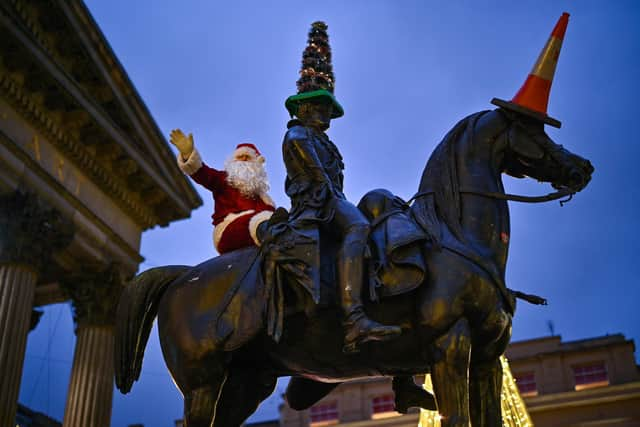Think celebrating Christmas is 'un-Scottish'? Time to bring back the 'Daft Days' – Susan Morrison
On December 25, 1828, the Caledonian Mercury ran with the big story of the day. Not a report of a last-minute rush for those special presents, or how revellers were crowding the thoroughfares, or even a festive moan about how commercial Christmas had become.
It was a sensational two-page special covering the trial of William Burke, one half of the most infamous double act in Edinburgh crime. William Hare, his murderous partner, had turned Queen's Evidence, literally hanging Burke out to dry.
Advertisement
Hide AdAdvertisement
Hide AdThe coverage is virtually verbatim. The trial began at ten in the morning of Christmas Eve. At three o’clock on Christmas morning, Burke's lawyer rose to begin his defence. He was still talking at half past four when the correspondent for the Caledonian Mercury, possibly near passing out with exhaustion, wrote there would be a second edition and presumably reeled away to his bed. The jury had no such luck or choice, and had to remain until they passed the guilty verdict on Burke later that day.
This could rank as one of the worst Christmas Days ever, but for the lawyers, the accused, the jury and that indefatigable correspondent, December 25 was just another day in court. Famously, Scotland banned all the festive fun in 1640.
King James paid ransom to Abbot of Unreason
Before that, we’d had a whale of a time. Scotland had traditions of what we called ‘Yule’ like all European countries. There were religious services, of course, but there was also drinking, feasting and dancing. You’d expect that of a nation that needed a party in the middle of a cold dark winter.
The accounts of James IV detail monies paid to prepare the king's Edinburgh lodgings specifically for Christmas 1502. The king and his court enjoyed games and traditions where the normal rules were turned upside down.


Lower ranking members of the household would be temporarily elevated to roles such as ‘King of the Bean’, a sort of entertainment officer for the festive season, a mock monarch who would preside over the feasting. Jock Pringle, trumpeter, held the title at least once, as did John Goldsmith of the Chapel Royal. The Abbot of Unreason was a mischievous creature who played pranks. In 1505 the Abbot was Alexander Kerse, cook to the king. James paid him a ‘ransom’ for a vessel that he had hidden. The king clearly played a good game when it came to Yuletide mayhem.
Yule began on December 25, and ran through Hogmanay until the first Monday of the new year, known as Handsel Monday. The word ‘handsel’ or ‘hansel’ refers to the giving of gifts. Presents could be exchanged then, or at Christmas, or on New Year’s Day, it varied over time. Collectively, these celebrations were known as “the Daft Days”, when eating, drinking and generally running amok were permitted, even condoned.
‘Filthy’ carols, ‘extraordinary’ drinking
Scotland’s very merry Yule time didn’t sit well with our religious reformers. They demanded a simpler form of worship. In the early days of the Reformation, the kirk cracked down on what they saw as frivolous ways of celebrating holy days. They didn’t ban Christmas. They just banned the fun bits.
By 1640 they doubled down even harder. The ‘Yule Vacance’ (Christmas holiday) was outlawed. “The Kirk within this kingdom is now purged of all superstitious observations of dates…” It’s notable that Presbyterian Scotland uses the term ‘Yule’ throughout its anti-festive legislation. Perhaps the lawmakers found the word ‘Christmas’ a tad too Catholic.
Advertisement
Hide AdAdvertisement
Hide AdFines and stern lectures were meted out to any fool who got caught being festive. Some women in Aberdeen were given a right ticking off for singing "fylthy karrells on youll day". The kirk was busy. Other secret revellers were caught selling Yule loaves, dancing, cross-dressing and indulging in “extraordinary drinking”.
Christmas restoration
In 1741, the ban was lifted, and Scotland’s Christmas crept back out of the cupboard. It had never really gone away. On January 2, 1772, Robert Fergusson, one of Scotland’s greatest poets, had his first work in Scots published. It was called The Daft Days. It is a beautiful poem, and proves the traditions of feasting, dancing and merrymaking had survived the stony gaze of the granite-faced kirk.
As he writes “When merry Yule-day comes, I trow,/ You’ll scantlins find a hungry mou;/ Sma’ are our cares, our stamacks fu’ O’ gusty gear”. It's a joyous read, although there is a warning at the end that too much of the “aqua vitae” can make the Scots a tad “capernoity”. Which could bring you to the attention of the “black banditti, the Black Guard” (Town Guard). Then, as now, too much Christmas bevvy can lead to a run-in with the polis.
The festive tinsel tide continued to rise, but slowly. In the 1950s, my own grandmother refused to have a Christmas tree in the house. It was, she announced, papist and frivolous. What she’d make of a seven-foot-high, LED colour-changing, fake Douglas Fir is anyone's guess. She wasn’t alone, which is why Christmas Day didn’t become a holiday in Scotland until 1958.
Today we can openly make merry to celebrate Yule on December 25. Unless you live on Foula, Scotland’s most remote inhabited island.
In September 1752, Britain introduced the Gregorian Calendar. The old Julian calendar was 12 days behind the newcomer. To get into line, September 2 was immediately followed by September 14.
People thought they had been filched out of 11 days. There were riots. Not on Foula. They just ignored it, and carried on being Julian, celebrating a second Christmas, or Auld Yule, on January 6 and New Year’s Day, or Newerday, on January 13.
We revived Yuletime. Perhaps we should bring back the Daft Days, too, although possibly not lasting until January 13.
Comments
Want to join the conversation? Please or to comment on this article.
